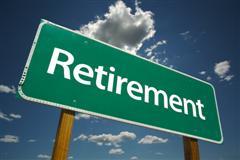| Home | About | Archives | RSS Feed |

The Independent Investor: Oil Hits My Price Target
 If there is one thing I've learned in forecasting commodity prices, you have to be disciplined. Here in the U.S. our benchmark crude for April delivery hit an overnight high of $103.41 in electronic trading. It's time to sell.
If there is one thing I've learned in forecasting commodity prices, you have to be disciplined. Here in the U.S. our benchmark crude for April delivery hit an overnight high of $103.41 in electronic trading. It's time to sell.
One-hundred-dollar oil has been my target now for well over a year. It is an interim price target because I still believe that over the long term (over the next few years) we will see the price of oil much higher. But for now this rally is on its last legs.
"How can you say that?" demanded one client who just recently jumped on the oil bandwagon. "Don't you read the news? The Middle East is coming apart. The world's oil supplies are in jeopardy."
That is the kind of sentiment that makes me feel even more confident that it is time to take profits. Sure, there are pressing issues over in oil land and I don't deny that there will be additional turmoil before all is said and done. However, I do not believe that the world's oil supply is in jeopardy.
Keep in mind that Libya produces less than 2 percent of the world's oil. Its "King of Kings" (as Moammar Gadhafi likes to be called these days), is in my opinion, a certifiable madman and his ultimate demise would be cause to celebrate. However, that may take some time to engineer and in the meantime oil will most likely stay at these nose-bleed levels. Ultimately, when the crisis has passed, we will once again be back to a global economy that is growing slowly and definitely not at a pace that justifies such high price levels for energy.
This temporary spike in oil is great news for the media. It has spawned an entirely new "what if" series of gloom and doom economic scenarios, which in turn has driven the stock markets down 3 percent.
"Auto sales will be decimated," says one talking head.
"Four-dollar gas is round the corner," predicts a young gas station attendant solemnly.
"The economy will be thrown back into a recession," says an economist, still smarting from his conviction that we would experience a double-dip recession in 2010.
"The consumer will be crushed."
"Restaurants will close."
"It's the end of the world." (My quote).
Those kinds of statements will certainly sell newspapers or keep you tuned into CNBC, but beyond their entertainment value, I see no point in listening to these Doctor Dooms.
Folks, my advice is to keep this present state of affairs in perspective. We were badly in need of a market correction. Now, we have it, thanks to the Middle East.
A month from now when this blows over and the price of oil is considerably lower than today you will be wishing you did two things: 1) took advantage of lower stock prices and 2) sold oil, if you owned it.
Bill Schmick is an independent investor with Berkshire Money Management. (See "About" for more information.) None of the information presented in any of these articles is intended to be and should not be construed as an endorsement of BMM or a solicitation to become a client of BMM. The reader should not assume that any strategies, or specific investments discussed are employed, bought, sold or held by BMM. Direct your inquiries to Bill at 1-888-232-6072 (toll free) or e-mail him at wschmick@fairpoint.net. Visit www.afewdollarsmore.com for more of Bill's insights.
| Tags: oil |
The Independent Investor: Rebellion in the Mideast — The Internet Strikes Back
|
— Yoda, "Star Wars: The Empire Strikes Back" |
Thousands, if not millions, of demonstrators are protesting their unhappiness from one end of the Middle East to the other. Demonstrators in Iran, Bahrain, Yemen, Iraq, Algeria, even Libya, have followed the leads of Tunisia and Egypt in taking their grievances to the streets. At the center of this revolutionary movement is the Internet.
You may have seen the young marketing manager of Google, the Egyptian Wael Ghonim, on television or the Internet recently. He is credited with starting the Facebook page that helped spark the revolution that ended in the demise of Hosni Mubarak, the autocrat who ruled Egypt with an iron fist for the last 30 years.
"This is the revolution of the youth of the Internet and now the revolution of all Egyptians," this hero of Egypt's revolution said in an interview with the Associated Press.
What struck me most was his sincerity, his matter-of-fact trust in the Internet and its members as opposed to his government. He believes that the Egyptian regime's biggest mistake was cutting off the country's access to the internet. I agree.
 By its actions, the Mubarak government acknowledged its greatest fear and confirmed that they no longer had control of the dissemination of information. Middle Eastern regimes (among other repressive societies) have realized full well the value of propaganda and the tight control of communications. Up until the introduction of the Internet, it was a fairly easy job to control the main outlets of communication; namely print, television and radio.
By its actions, the Mubarak government acknowledged its greatest fear and confirmed that they no longer had control of the dissemination of information. Middle Eastern regimes (among other repressive societies) have realized full well the value of propaganda and the tight control of communications. Up until the introduction of the Internet, it was a fairly easy job to control the main outlets of communication; namely print, television and radio.
Since these regimes controlled the media, only their special brand of the "facts" were allowed to be disseminated to the populace. The internet changed all that. Those who feel oppressed have access to alternative views of the facts and can decide for themselves whether they are being manipulated and exactly how that manipulation is unfolding. Since information is the foundation of any and all governments, the Internet has made it impossible for oppressive regimes to continue their monopoly on information dissemination.
Internet penetration in the Middle East remains modest at 29.8 percent, according to Internet World Stats, while Asia boasts a 21.5 percent penetration. Africa overall has only a 10.9 percent penetration compared to the U.S. at 77.4 percent. However, as in the rest of the world, penetration is growing by leaps and bounds in the Middle East (over 1,800 percent in the last 10 years). As computers and cell phones proliferate, governmental control of the traditional sources of information becomes much less effective.
Demographics are also aiding and abetting the Internet as a world force for change. In just about every country presently impacted by growing rebellion, the age of the population has been a contributing factor. The region is facing a demographic bulge in age with youth aged 15 to 29 comprising the largest proportion of the population.
At the same time, this segment of the population is bearing the brunt of the region's high jobless rates and skyrocketing costs of food. The traditional and growing disparity between the "haves" and the "have-nots" within their societies has not been lost on these young people who, for the most part, are highly educated. Generally speaking, patience is not a strong point with the youth and, in my opinion, has lost what little patience they had with the political, social, economic and religious oppression of their governments.
Let's face it, most of the Middle East is ruled by religious fanatics, dictators or corrupt kings. None of these regimes are fertile grounds for economic opportunity, the empowerment of women, or equitable access to resources and education. Unfortunately, these are all necessary ingredients if the region's leaders intend to harness the youth, a key human resource, in growing their economies.
What they (and other governments) are only now beginning to realize is that their youth is the Internet generation. It has become a part of their everyday experience, unlike those of us who have not grown up with this phenomenon. As such, the Internet has become the conscience of all societies.
Its adoption has facilitated a meeting ground where the world's angry and disenfranchised youth can band together, gather en masse, if need be, and deliver thousands, if not millions, of protestors into the streets with a simple tweet or the creation of a Facebook page. I expect unrest, rebellion and unfortunately, repression to continue so fasten your seat belts.
Bill Schmick is an independent investor with Berkshire Money Management. (See "About" for more information.) None of the information presented in any of these articles is intended to be and should not be construed as an endorsement of BMM or a solicitation to become a client of BMM. The reader should not assume that any strategies, or specific investments discussed are employed, bought, sold or held by BMM. Direct your inquiries to Bill at 1-888-232-6072 (toll free) or e-mail him at wschmick@fairpoint.net. Visit www.afewdollarsmore.com for more of Bill's insights.
| Tags: Internet, revolution |
Independent Investor: Are Dividend Stocks a Good Investment?
 Dividend stocks have outperformed nondividend paying stocks since 1972. However, the companies that had provided the best track records in paying and increasing their dividends have either been acquired, stopped raising dividends or in some cases even eliminated them. Given that a large number of baby boomers are set to retire in the next few years with definite income needs, I believe that the demand and supply of dividend paying stocks will only increase.
Dividend stocks have outperformed nondividend paying stocks since 1972. However, the companies that had provided the best track records in paying and increasing their dividends have either been acquired, stopped raising dividends or in some cases even eliminated them. Given that a large number of baby boomers are set to retire in the next few years with definite income needs, I believe that the demand and supply of dividend paying stocks will only increase.
But the last few years of turmoil have shaken the confidence of many dividend believers. In the S&P 500 Index about 370 stocks pay dividends at any given time. In 2009, those dividends declined by 20 percent. That's on top of a 35 percent sell-off in stock prices in 2008. For those dividend investors living on the income generated from their portfolios, this double whammy was devastating.
A great many investors finally threw in the towel, sold out and moved to the sidelines in the beginning of 2009. In hindsight, that was the wrong move. Even today a lot of those investors have not re-entered the market.
Although dividends gained back 5 percent last year, they are still 17 percent below the level companies paid in 2008. Some pundits believe that it will take until 2013 before dividends are back to the 2008 level. That may be true for some companies but not all companies are the same
For example, the 70 companies with the highest annual dividend growth rate over the past three years have outperformed 58 percent of all stocks in the S&P. They are predominantly mature businesses that have strong cash flows, stable profit outlooks and lower operational risk, on average, than other companies. In my opinion, if an investor does his due diligence on a targeted list of companies, he or she can be rewarded with both additional yield as well as some price protection. But the devil is always in the details.
Recently a reader asked if dividend payers perform well in an inflationary economy; evidence indicates they do.
In the period 1974-1980, when the inflation rate was 9.3 percent, the return on the S&P index averaged 9.9 percent a year. The dividend component of this return (4.9 percent) accounted for nearly half of the overall return. Obviously, if things go the other way (a deflationary environment), dividend payers shine because they are, by definition, defensive and provide a stream of income.
I believe we are in an economic recovery. Economic and earnings cycles typically encourage and support accelerating dividend growth and this recovery should be no different. In addition, many companies hold a record amount of their net worth in cash due to the peculiar nature of this last recession. I believe managements will use that cash to increase dividends and/or buyback stock.
This is where your due diligence comes in. If you did your homework, you would discover that just 10 stocks account for 32 percent of the cash (ex financial companies) in the S&P 500. Those 10 stocks receive an average of 56 percent of their sales from outside the U.S.
If you further believe that the dollar will continue to decline and that some overseas markets will grow at a faster clip than the U.S., then it makes sense to look at those 10 in relation to how much dividends they generate.
That is not the only criteria an investor should use in selecting dividend stocks. Free cash flow coupled with strong earnings growth, low debt to equity, a track record of increasing dividends over at least 5, if not 10 years, are just some of the variables investors should use to fashion a high-quality dividend portfolio.
Unfortunately, many investors simply look for the highest-yielding securities they can find. That only works in a bull market. At the first sign of problems, those yields evaporate along with the price of the stock. That brings up the final issue. How to invest in dividend stocks in today's markets?
Readers are aware that I am not an advocate of the buy-and-hold investment philosophy. I believe firmly that we are in a long-term bear market that could last for another 5 or 6 years. Right now we happen to be enjoying a rally that could continue for another 6 months to a year, but at some point it will end. Therefore the investor must mange risk and no longer depend on just the dividend to cushion declines in his portfolio. You might, for example, establish a rule that a company that cuts its dividend is an automatic sell or begin to liquidate stocks once the S&P 500 index breaks its 200 day moving average. The point is that you must manage your portfolio actively, which requires a lot of work.
Another highly recommended alternative is to hedge your portfolio with covered options. The cost of that protection will reduce your overall returns but you will sleep better at night knowing that if we revisit the declines of 2008-2009 your portfolio will at least be protected from price declines. Bottom line: dividend stocks do have a place in your portfolio, if you are willing to work for it.
Bill Schmick is an independent investor with Berkshire Money Management. (See "About" for more information.) None of the information presented in any of these articles is intended to be and should not be construed as an endorsement of BMM or a solicitation to become a client of BMM. The reader should not assume that any strategies, or specific investments discussed are employed, bought, sold or held by BMM. Direct your inquiries to Bill at 1-888-232-6072 (toll free) or e-mail him at wschmick@fairpoint.net. Visit www.afewdollarsmore.com for more of Bill's insights.
| Tags: dividends |
The Independent Investor: Why Baby Boomers Are Grumpy
 You would think those born between 1946 and 1965 would have a lot to be thankful for. After all, the first wave of those baby boomers is finally eligible to retire in 2011. The recession appears to be over and jobs are beginning to make a comeback, even the stock market is performing well — so what's the problem?
You would think those born between 1946 and 1965 would have a lot to be thankful for. After all, the first wave of those baby boomers is finally eligible to retire in 2011. The recession appears to be over and jobs are beginning to make a comeback, even the stock market is performing well — so what's the problem?
The Pew Research Center's recent survey on baby boomers indicates that fully 80 percent are "dissatisfied with the way things are going in the country today."
Quite a bit of that unhappiness can be traced to personal finances and negative economic views. That makes sense since boomers were hit harder than most segments of the population by the double whammy of declining stock prices and housing prices. For those laid off who are older than 50 years of age, it has been harder to obtain a new job. And even those who are employed argue that real income has stagnated over the last decade. As a result, the majority say their household finances have worsened and a higher portion of boomers than other ages have had to cut spending this year.
The current estimate of baby boomers in America is 79 million, about 26 percent of the total U.S. population. Although they still consider retirement age at 65, the typical boomer believes that old age doesn't begin until age 72, according to the survey.
Times have changed since the boomers came of age in the '60s and '70s. Back then, America was the land of honey and horizons seemed to stretch forever. Now, most boomers point to the huge national debt, the deficit, a lack of political leadership and lament that America is past its prime. They and their country are in decline, or so the story goes.
"My parents worked hard, saved, retired and enjoyed their golden years," said one disgruntled boomer, (who gave me the idea for this column).
"Why can't I do the same?"
Actually, there are a number of reasons why this time around it is different and most of the fault lies with us Boomers. Back in the day, our parents were part of a pension plan that included monthly retirement savings on the company's tab. My Dad was a machinist at SKF (a ball-bearing manufacturer) for 30 years and worked another full-time job at night. The pension contributions increased as his salary rose and as the number of years worked at the company increased. His pension was conservatively managed by trained professionals. It was also fairly easy to calculate the money he would be receiving on the first day of retirement and my parents planned for that.
Their mortgage was fixed and ended right around the time of retirement. Your parents also knew how and what their medical plan would be in retirement as well as Social Security benefits. Most costs were controlled, or at least somewhat contained while families lived frugally and spurned debt. Some did so successfully and enjoyed those golden years, others (like my Dad who died of a massive heart attack a few years after retiring) didn't do so well, but at least the results were fairly predictable.
We baby boomers wanted more.
We did away with pensions and took control of our own retirement in the form of deferred-retirement plans like 401(k)s and IRAs. The problem was that contributing to those plans was voluntary (unlike pension plans). And somehow there was always something more important to spend our money on. Besides it was much more fun to "flip houses and make a killing" than make those monthly contributions toward retirement.
Even those who did save only kinda sorta did it. Self-directed, deferred-retirement plans should have done exceptionally well in the period from 1982 to 2000. It was the greatest bull market in recorded history, but few actually put enough money in these plans to make a difference. By 2001, when some of us actually began saving more, we watched those savings first disappear during the Dot-Com bust and then again more recently in 2008-2009. As a result, retirement plans actually went nowhere in the last decade.
As if that wasn't a low enough blow, those of us who counted on our houses to bail us out — the "I can always sell my house" crowd — witnessed that store of wealth decline 30 percent in the last two years. Houses are not moving, or if they are, sellers are forced to take a cut depending upon the size and location of your home. For someone forced to sell, faced with the prospect of living on social security with insufficient retirement savings, there is definitely something askew with the American Dream. It is no wonder that Boomers are grumbling. Many feel their country’s economic prowess has peaked and the promise of prosperity for all has been broken. Living the dream for many has turned into living a nightmare.
Maybe it was that old long-haired hippie in us that whispered we would live forever so why worry about retirement, or if we really had to, we could get by living in our old VW bus. It is only now that those romanticized notions are disappearing in the face of reality. But it is not too late. Maybe you can't retire at 65 but that may turn out to be a good thing. You can always start saving, and if I am right about the stock market this year, even first-time investors could make a substantial return on their money.
This country still holds promise for those willing to grasp it. No one is ever too old for that.
Bill Schmick is an independent investor with Berkshire Money Management. (See "About" for more information.) None of the information presented in any of these articles is intended to be and should not be construed as an endorsement of BMM or a solicitation to become a client of BMM. The reader should not assume that any strategies, or specific investments discussed are employed, bought, sold or held by BMM. Direct your inquiries to Bill at 1-888-232-6072 (toll free) or e-mail him at wschmick@fairpoint.net. Visit www.afewdollarsmore.com for more of Bill's insights.
| Tags: baby boomers, pensions, retirement |
The Independent Investor: It's Time to Get Back Into Real Estate
 Housing has been the bad boy of the financial markets ever since the first subprime mortgage loan went bad back in 2007. So it may come as a surprise to some that I believe that this scorned and much-hated sector of the economy is ripe for a comeback. But don't look for a get-rich-quick kind of reversal.
Housing has been the bad boy of the financial markets ever since the first subprime mortgage loan went bad back in 2007. So it may come as a surprise to some that I believe that this scorned and much-hated sector of the economy is ripe for a comeback. But don't look for a get-rich-quick kind of reversal.
Recently, the data in the real estate markets has been confusing, even contradictory, which is what one would expect in a bottoming market. For example, the National Association of Realtors said that 2010 was the weakest year for home sales since 1997 and the number of foreclosures in 2011 will continue to weigh on home prices, which are expected to fall even further in the next six months.
Given these somber statistics, why would anyone want to invest in real estate? As a contrarian, I often like to invest in markets that most others shun, especially when I believe the worst is just about over. Over the last few months, certain housing statistics indicate a bottom is forming in this sector, in my opinion.
For example, existing home sales hit their low in July 2010 and have steadily increased each month since then (with the exception of October). For December, sales were up in all parts of the country with the strongest gain coming from the west with a 16.7 percent increase. Sales rose 13 percent in the Northeast, 10.1 percent down South and 11 percent in the Midwest.
Many bearish forecasters, however, point to the rising tide of housing inventory as a reason to stay away from the sector. The more inventory there is to sell, the more prices must go down, and the more time it will take before supply and demand of houses is back in equilibrium. Last month, the inventory of unsold homes stood at an 8.1 month supply, down from 9.5 months in November. The trend looks good but unfortunately it is still far from normal since the historical average of normal inventory is 4.5 months supply.
In September 2010, there were 3,585,000 homes for sale. However, lurking out there are all those houses whose mortgages are in default called "shadow inventory." That represents another 3,776,200 units that could possibly be dumped on the market. If we assume that 50 percent of them will ultimately be added to the national housing inventory, then it could take as much as two years to work off (sell) this entire inventory, assuming that no new inventory came on the market.
New inventory (housing starts) will continue to grow at the same time, but the data indicates housing starts are growing at a declining rate. Since March we've experienced a 20 percent decline in the issuance of building permits. Housing starts dropped an additional 4.3 percent in December. It appears that the big national homebuilders will be cautious for the foreseeable future in building new homes until a recovery begins.
Of course, the real key to the housing market is the growth rate of employment. Without a job, there is little one can buy, regardless of how low housing prices or mortgages rates go. There again the data points to an uptick in employment and the Fed and government are doing everything they can to boost that number.
Most people I talk to have nothing positive to say about the real estate market. Some investors actually hate it, especially if they suffered major losses in REITs or other real-estate related securities. That's the time when many smart people start paying attention. Two men I respect, Warren Buffet and hedge-fund manager John Paulson, are predicting the housing market will bottom this year. I agree.
Remember, too, that in this era, when so many investors are concerned about future inflation, real estate has provided a supurb hedge against inflation along with other commodities. If you are an investor with a short-term horizon (the next 3-6 months), then real estate is not for you, but if you have the patience to invest now and hold for a few years, I believe now is the time to buy. Please call or write for my specific recommendations.
Bill Schmick is an independent investor with Berkshire Money Management. (See "About" for more information.) None of the information presented in any of these articles is intended to be and should not be construed as an endorsement of BMM or a solicitation to become a client of BMM. The reader should not assume that any strategies, or specific investments discussed are employed, bought, sold or held by BMM. Direct your inquiries to Bill at 1-888-232-6072 (toll free) or e-mail him at wschmick@fairpoint.net. Visit www.afewdollarsmore.com for more of Bill's insights.
| Tags: real estate |

 For my ally is the Force, and a powerful ally it is. Life creates it, makes it grow. Its energy surrounds us and binds us.
For my ally is the Force, and a powerful ally it is. Life creates it, makes it grow. Its energy surrounds us and binds us.
